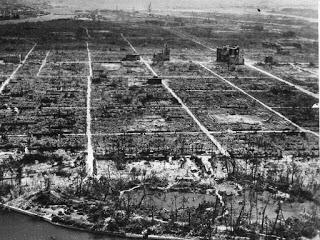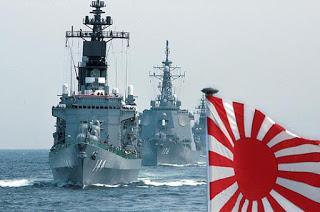The reaction of Japan to its current situation is a potent example of the difficulties of nuclear disarmament. Those traumatized by atomic bombings 70 years ago don't want a future generation of Japanese to experience the horror of their personal experience. They have come to appreciate the value of the pacifist constitution, forced on Japan by the U.S. after WWII. The side of that not often discussed is the fact that the U.S. is the ultimate guarantor of Japanese security -- including a heavy conventional presence and extended nuclear deterrents.

Hiroshima Destroyed by U.S. Atomic Bombing August 1945
Whereas Japan is not obligated to defend the U.S., the U.S. is obligated to defend Japan, even in a nuclear exchange if necessary. Japan will not and should not allow the U.S. to shirk its responsibility since that was the essential bargain in exchange for Japan's pacifist military posture.Now, Japan is surrounded by hostile nations that have not forgiven WWII atrocities and, in some cases, older conflicts (e.g., the Russo-Japanese War). China is rapidly building a modern nuclear weapon capability of poorly understood scale. North Korea continuously threatens Japan with its nuclear arsenal and has even kidnapped Japanese citizens. South Korea's enmity with Japan simmers beneath the surface, held at bay by close conventional alliances and extended nuclear deterrents from the U.S. in both cases. Russia still holds the Kuril Islands since the end of WWII. The angst against Japan runs deep, fueled by a history of genocides, human trafficking, 'comfort women,' etc., under the dominance of the Japanese empire.
Thus, being pacifist in a very dangerous neighborhood today is purchased by a history of U.S. dominance in the Pacific theater since WWII, nothing more. Given direct and accelerating challenges posed by China to U.S. regional dominance, continuous threats to Japan in North Korean rhetoric and its ballistic missile launches over Japanese airspace, and the U.S. tiring of the high cost of maintaining a post WWII military sphere of influence in both Asia and Europe, Japan is reasonably concerned about its position looking forward.

____________________________________
Jon Phillips is a Senior Nuclear Technology Expert at the International Atomic Energy Agency and Director, Sustainable Nuclear Power Initiative at Pacific Northwest National Laboratory. The opinions expressed here are his own.

